(This article is No. 6th of a serial reporting about <Secret of Danish Happiness> written by Yeonho Oh who is a Founder/CEO/reporter of OhmyNews........editor's note)
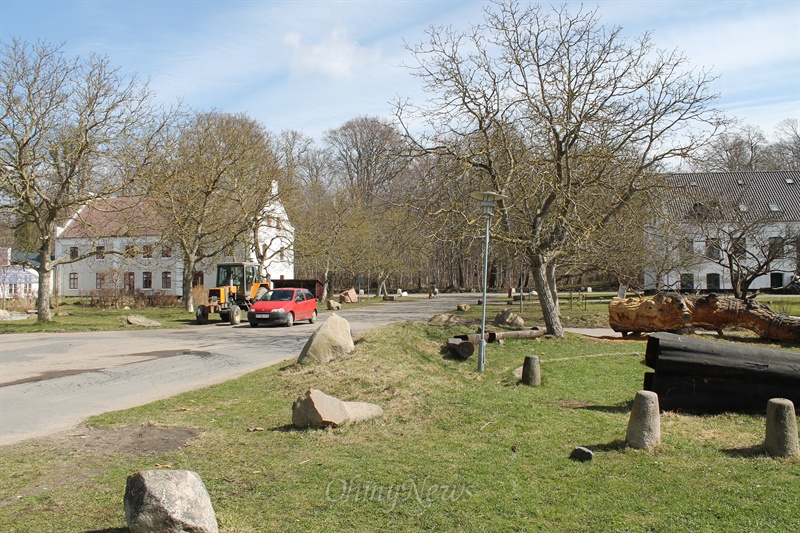
▲ Svanholm community has been experimenting with economy-sharing and eco-friendly alternative life for the last 35 years.
Can you be happy if you can freely use only 20% of your income but have to share the rest with your community members? There are people who say "Yes" with no hesitation. Do you want to know who they are? If you open Google Maps and type this address(Svanholm Alle 2, 4050 Skibby, Denmark), you will find a small village surrounded by a forest of green trees. There are about 30 structures, small and large, including a 3-story apartment where 80 adults and 50 children live. This is the Svanholm community, which has been experimenting with economy-sharing and eco-friendly alternative life for the last 35 years.
During the 60-kilometer drive down to the southwest from Copenhagen to Svanholm, I could not find any trace of mountains. This is not surprising considering that the highest mountain in Denmark is just 173 meters tall. Just like the even landscape, the inequality index of Denmark looks very flat. According to recent OECD data, the income of the richest 10% in Denmark is 5.3 times that of the poorest 10%, the lowest among 35 countries. Compared to that of America, which is 15.9 times, you can grasp how narrow the gap is.
Even more equal is the Svanholm community, where the income gap between the haves and the have-nots is almost zero. There is no notion of the richest or the poorest, because 80% of an individual's income belongs to the community. Several questions arose in my mind as I was driving to the village and looking at endless flatland through the window. What kind of people can control the greed called individual possession in this market economy-oriented planet? Why have these Danes started experimenting with this kind of 'extremely sharing' community, even though they are living in one of the most equal and happiest countries? What makes them think that current Danish society is not good enough? What energizes them to dream of a 'perfect society'? So are they happy now?
"Here every member is a leader of this village."
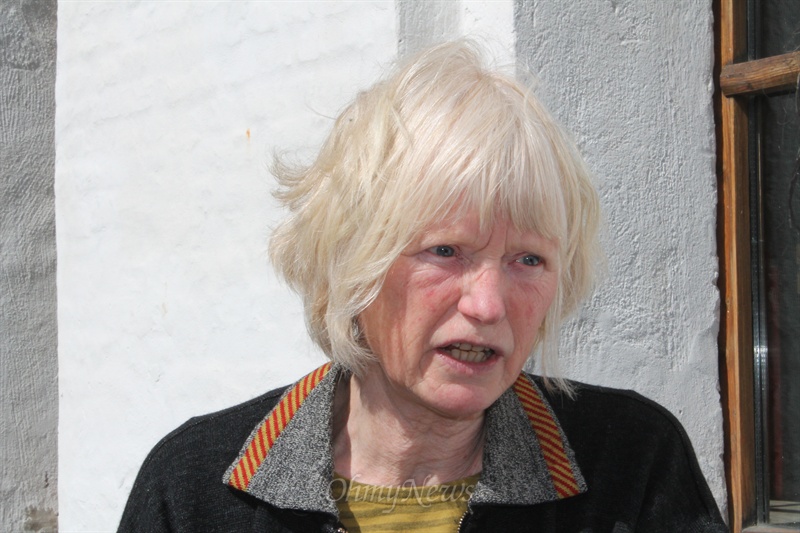
▲ One of the founders Mrs. Laegaard believes that the village's philosophy is "in one word, sustainability."
When we arrived in Svanholm, Mrs. Elsebeth Laegaard, a woman in her late 50s, welcomed us. She is one of the founders of this community that started in 1978.
"I was a university student when a friend of mine asked me to join. I got married here and raised two children. There were 84 adults at the beginning, and only 12 of them are left."
Now 80 adults and 50 children are living in Svanholm. What kind of philosophy has been able to maintain this community for so long?
Mrs. Laegaard believes that the village's philosophy is "in one word, sustainability." To make it real, the members of this village practice these 4 main values: ecology, income sharing, communal living, and self government.
There are 35 different jobs in Svanholm, ranging from farming and cooking to construction. Mrs. Laegaard, as a medical doctor skilled in acupuncture, is in charge of taking care of health of the members. I asked her if she was a head of the village since she was one of the founders and was guiding me. But she simply said, "We have no leader."
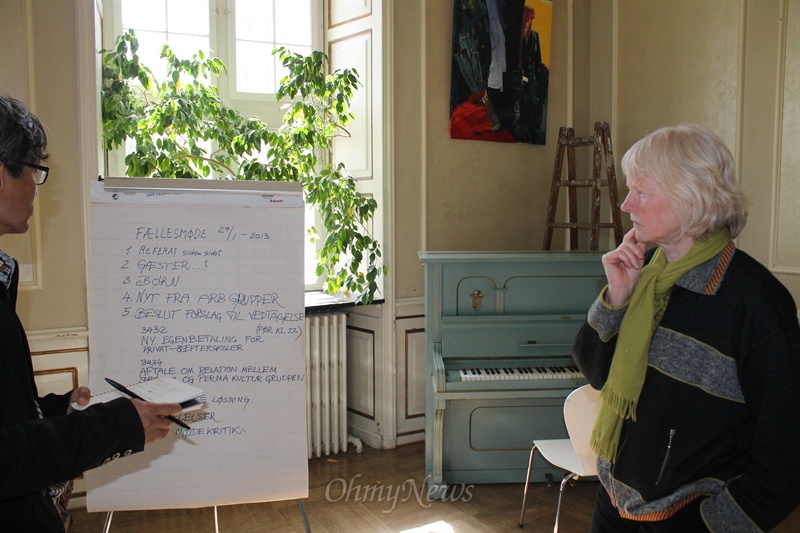
▲ Common meeting room: "here every member is a leader of this village."
"No, I'm just the person to talk to you today(laugh). We actually don't want to have one single person as a leader. Yes, we have leaders of different parts of this community. But we have no overall leader, we are all leaders. The leader is our common meeting. We all can attend the meeting."
She gave me a tour of an old apartment building where most members of the village live. A big room in the center of the apartment, built in 1700's, is used for the common meeting. Besides a piano, a chart showed what were the topics for the last meeting. Among recent issues, one was how much to spend to build a new stable.
"We have more than 100 cows to have milk and we were going to build a new house for the cows because the old one had burnt. But it was a long discussion to decide. How big should it be and how much should it cost? Because we had to take out a big loan. These are things we have to decide."
Since humans manage the Svanholm community, naturally there are conflicting views about, for example, how many rooms one family should have and how big they should be. Then what happens if there is a tense confrontation about a sensitive issue?
"When we make decisions, we don't vote. We discuss until we come to an agreement. That's one of our principles. So sometimes it takes a long time to discuss."
I said to Mrs. Laegaard that "the motto of OhmyNews is every citizen is a reporter." She responded "here every member is a leader of this village."
- What should I do if I want to join this community?
"First, you may send us an email letter, can I come and see the place? Then we have a group who will read the letters and ask the people why they want to come. You may visit here several times. It's a process of 1 year, 2 years. And if the decision is made that you want to live here, we accept you as a community member. Even then, you can have a year where you can change your mind."
- Change mind? Does it mean that any member can leave here at any time?
"Basically yes. Of course you cannot move out tomorrow. You have to inform your decision to the community 6 month before you leave."
In Svanholm, you have to deposit all assets to the community when you move in, and you can take them back when you move out.
- So what about you? You have lived here around 35 years. Have you been happy?
"Not always. Of course there were times when I was not content. But if I'm not content, I ask myself why. Is it because you want to move? And until now, I have always chosen to live here. And try to solve the problems. Throughout 35 years, I have chosen to live here. And when our children were growing up here, we asked them, is it okay if we live here or should we go to another place? And every time we asked, they would look at us and say, 'why do you ask? Of course we want to live here'. And now that they are an adult, they tell us often that they are very happy that they could have their childhood and the things they have learned while living in this community."
80% of his income belongs to the community?
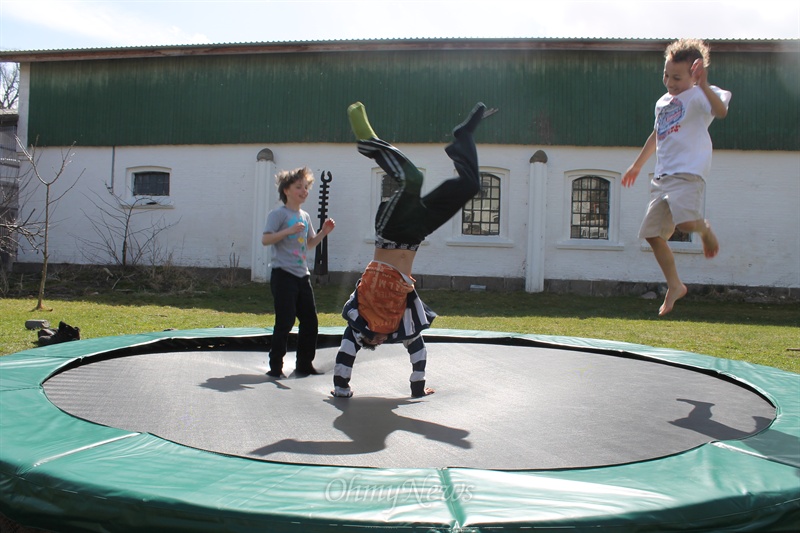
▲ Communal living: Svanholm seems indeed a great place to raise children.
While I was walking around the village with Mrs. Laegaard, I met a woman in her 40's who was painting words on a wooden board. She was a newcomer who had been living in the community for 4 months. I asked what she was doing, and she replied that she was making an information sign for visitors to an upcoming village festival. Why did she, a teacher of an elementary school nearby, join this community?
"Before I came here, I lived in a small community in the city. But then as I got 2 kids, I thought it would be better for them to live in the countryside. But I still wanted to live with other people, so we thought this was the very place. Now my children are really enjoying here."
She was giving a present called communal living to her children. Another teacher Mr. Mikkel Brink, in his 30's, chose this community for the same reason -- for his 2 children. Considering that his child and other children were playing restlessly and having a fun time during the 30 minutes of the interview with Mr. Brink, it seemed that Svanholm was indeed a great place to raise children.
But a big question remained for the father, who was teaching music in an elementary school outside the village. How could he accept that 80% of his income belongs to the community? Was there any conflict or hesitation inside him?
- You just have 20% of your income. It makes you…I mean, a better person? You have no greed?
"All the value I have here is not about money. By choosing to live here, we have also chosen to not have that much money and it's some part of our conviction that we should take care of the planet and we should live organic. Of course, as a human being, I have some kind of greed inside. But by living here, I try to control that greed. Sometimes I want to buy a big car, but I should suppress it. It's a way to consciously control my own greed because I can't do the same as I can when I live outside."
He said the 20% of his income is enough to live in this community because housing and food are free even though he has to buy clothes and pay for tickets to enjoy cultural events.
- Don't you envy your friends living in big cities and traveling around the world?
"When I see my friends who are traveling abroad many times a year, I also feel that I can never go to Paris. And sometimes I feel strange but at the same time I also feel that it's good that I don't just rush out to do all these things, which is not so necessary, which is actually a part of the destruction of the planet."
- So you are feeling that you are controlling your greed.
"Yes, somehow."
- Wow, it's a very big thing.
"Yes it is."
- Anyway, you chose this life. Are you happy now?
"I feel that I am happy. But of course I am a human being so I have a lot of...all of these stress and worries and all of that stuffs like every other people. It's normal for human beings. But I think also that you can affect your state of mind by your surroundings. To me these surroundings are more appropriate to avoid the stress, or worry, because you have a community."
Most members of Svanholm are Danish. Therefore they are enjoying the Danish welfare system like any other Dane. But these people think that the state of welfare in this community is stronger than it is on the outside, because they have very close neighbors. Mr. Brink said, "if someone is sick or in crisis, every person here helps him."
One reason the members have close relationships with each other lies on having meals together. Members eat lunch and dinner together in a big common restaurant where chefs, who are also village members, prepare fresh 100% organic food, such as vegetables, beans and milk produced in a farm of its own. Mrs. Laegaard said with a laugh, "Thanks to the village chefs, I have never cooked myself for 35 years, even though I am a mom." She added, "In knowing that these kinds of healthy food are prepared by our very neighbors, it feels so good."
- Since the members eat 100% organic food everyday, you must be healthier than other Danes.
"We think so, but we cannot be sure. But I think we can all live to be 100 years old."(laugh)
The villagers farm 100% organic food not just to prepare meals for themselves, but also to make money to manage the community. They sell the food to markets outside, and the profit has enabled Svanholm to break even and buy more lands to farm.
No risk even if they fail
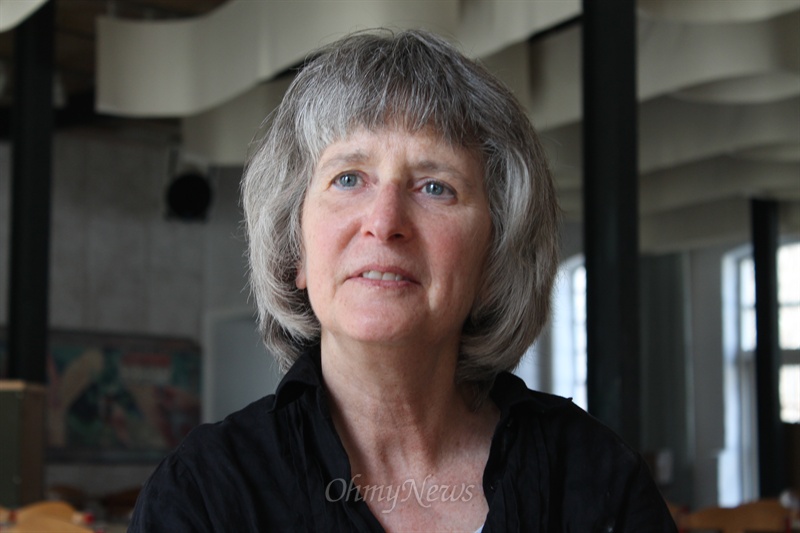
▲ American guest Mrs. Katy Lindbald said "The quality of life is very high here."
Finishing the tour around the village, I asked Mrs. Laegaard.
- Svalholm has some characteristics of ideal Socialism that socialistic countries once dreamed of but failed to achieve. What do you think is the difference between Svanholm and failed socialistic countries?
"We chose it by ourselves. Therefore we think the freedom of individual is very important even in this community. That is the big difference."
Indeed, even though 80% of their income goes to the community, members enjoy their maximum level of freedom, within limits. More than half of the adults have a job outside the village. The others who have work in the community finish their work around 5pm and enjoy free time without any disturbance.
Foreign visitors are constantly coming to experience and study this unique community. About 10 to 20 people visit in summer to stay for 2 to 3 months. Mrs. Katy Lindbald, in her late 50's, is one of them. She is an American who served the State of Minnesota for a long time as anassistant commissioner for community development. Now her job is to cook and clean in Svanholm, and she has fallen in love with this community.
"The quality of life is very high here. What I love about this place is the sense of community. The people don't need to have everything. They can share. And this community has a good job. They are not all the same. They do have issues but they are able to talk about them and come to a resolution and live in harmony. And how many times do you sit down in a dinner with a plumber or with your child's day care provider with your electrician, with your cook? Everyone lives together and it's pretty cool."
Why do these people try to experiment with this kind of a special community even though Denmark's government has a good welfare system and Danish society is pretty much equal? Mrs. Lindbald gave an explanation to my key question.
"They don't have to worry about a lot of stuff that we worry about. They don't have to worry about their health insurance. But in the United States, a lot of people work at their jobs just in order to have the insurance coverage. Therefore, I think, in a country like Denmark, they have more ability and better opportunity to experiment and take risks. Because if there's failure they will still be okay. But in the United States, if they failed they would be really in a bad position."
Listening to the answer, Mrs. Laegaard nodded her head and said, "In a way, that was what I thought when I had just finished my education. No risk."
No risk even if they fail! It was the secure welfare system that enabled the birth of a creative experiment. Also because of the welfare system, this experiment could provide a quality of life that is much greater than that of other countries that are getting by. I felt I got the answer why the happiest Danes had been experimenting this kind of community.
In the first article of the serial reports about the <Secret of Happy Danes>, I analyzed the reason for the Danish happiness in 6 keywords: freedom, equality, security, neighbors, trust, and environment. Svanholm had all of those factors, and they boasted better quality of life than those of average Danish society.
After 2 hours of tour, I was waiting a bus to return to Copenhagen, grasping the last scene of Svanholm. What Mr. Brink said to me during the interview was echoing inside my head.
"If Denmark is the happiest country, and if we are the happiest in Denmark, we are maybe the happiest people on this planet. Who knows. (laugh)"